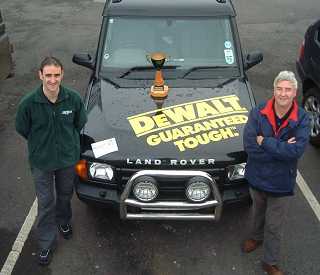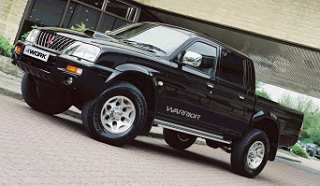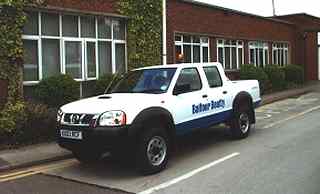
|
Welcome to 4x4NewsFrom 4x4web.co.uk THE off-road information & web hosting companyRecord 4x4web 2,927,068 file hits in MarRecord Hits from 112 countries In Mar
|
Latest news see 4x4NEWS or Go Back to
Go Back to Jan - Jun 2013 NEWS - Jly - Dec 2012 NEWS - Jan - Jun 2012 NEWS - Jly - Dec 2011 NEWS - Jan - Jun 2011 NEWS - Jly - Dec 2010 NEWS - Jan - Jun 2010 NEWS - Jan - Dec 2009 NEWS - Jly - Dec 2008 NEWS - Jan - Jun 2008 NEWS - May - Dec 2007 NEWS - Jan - Apr 2007 NEWS - Oct - Dec 2006 NEWS - Apr - Jun 2006 NEWS - Jly - Sep 2006 NEWS - Apr - Jun 2006 NEWS - Jan - Mar 2006 NEWS - Oct - Dec 2005 NEWS - Jly - Sep 2005 NEWS - Apr - Jun 2005 NEWS - Jan - Mar 2005 NEWS - Oct - Dec 2004 NEWS - Jly - Sep 2004 NEWS - Apr - Jun 2004 NEWS - Jan - Mar 2004 NEWS - Oct - Dec 2003 NEWS - Jly - Sep 2003 NEWS - May - Jun 2003 NEWS - Mar - Apr 2003 NEWS - Jan - Feb 2003 NEWS - 2002 NEWS
TERRANOTORY GROWTH
29 April 2003 Both the new Terrano Vans have SE in their titles. They answer the plea of many owner operators for more luxury in their 4x4 workhorse – not least because their van also has to do the job of weekend wheels. Furthermore, the SE will come as less of a shock for ex-company car types now capitalising on the tax advantages of running a van as company provided transport because air conditioning, a CD player, alloy wheels and anti-lock brakes are standard. But that’s not the extent of it. The SE builds on the kit you’d get with a standard Terrano Van, such as part-time 4x4 with low ratio gearbox, adding the following:
The added price is £1225 – rather good value when you consider what some rivals will charge you for air conditioning alone – making the basic price of a Terrano Van 2.7TD SE, £14,995. The 3.0Di 156PS engine adds another £850 to this ex-VAT price and turns the Terrano Van into something of a hotrod … in four-wheel drive van terms. Acceleration to 62 mph takes 13.3 seconds but its 32.1 mpg combined fuel consumption figure is more than reasonable. This engine also has a 200 kg advantage over the 2.7TD unit. That’s not the vehicle weight but what it will tow: 3000 kg. The proven 2.7-litre turbodiesel engine, which in a lesser form has powered London’s taxi fleet without complaint over many 100,000 miles, delivers 125 PS at 3600 rpm and 205 lbs.ft at 2000 rpm. The Terrano Van will move to 62 mph in 15.2 seconds and on to a top speed just shy of 100 mph should you have an airfield at your disposal. Yet its combined fuel consumption of 28.8 mpg won’t upset the company accountant. The side opening rear door reveals 1.65 m3 of load space with 1.3 m2 of load floor covered in hard wearing vinyl yet at 4242 mm long by 1755 mm wide, this Terrano takes up little more road area than an Almera hatchback. And at 1805 mm tall, height restrictions will rarely apply. Unchanged is the Terrano Van’s ability to wade through 450 mm of stream, climb a 39 degree gradient and clear ground-level obstacles 210 mm high. The driver can switch from two to four-wheel drive at any speed and, for really rough stuff, from high to low ratio with the limited slip diff ensuring best use is made of the engine’s power. And you won’t get stronger than a ladder frame chassis which – surprise, surprise – is just what the Terrano’s got. |
UK's Pickering wins coveted G4 Team Spirit AwardMoab, April 26th, 2003 While not the winner in this inspiring global Challenge, Pickering was delighted with his award. "Being judged by my peers as having displayed the best team spirit is the most satisfying moment of the whole Challenge," beamed Pickering after the announcement. Only the competitors were allowed to vote for this award, and it was the plucky Brit that received the majority of votes. Pickering ended the Challenge in 8th position, and was characteristically upbeat at the end of the event: "During the last month I have driven thousands of miles through unbelievable scenery. I have done amazing things, seen amazing places and made many friends for life. In this event winning really is secondary - just being here and part of it is more than enough for me." In the end it was Belgian fighter-pilot, Rudi Thoelen, who was crowned as winner in the inaugural Land Rover G4 Challenge. The 31-year old, from Zoutleeuw, outwitted and outlasted 15 other men and women, who each represented their home nation in this exciting new Challenge. The other competitors cheered and high-fived as the gutsy Belgian struggled his way up the concluding slope, before slapping his hand on the bonnet of a Range Rover, thereby cementing his first place, and claiming a new Range Rover as prize. Afterwards he slumped to the ground in exhaustion, his energies completely spent. During the last four weeks, the Land Rover G4 Challenge has covered almost 4 000 miles. Teams competed on three continents and in four time zones in four consecutive stages. They have run, kayaked, biked and driven their way through some of the most striking scenery on the planet. There can be no doubt that the Land Rover G4 Challenge is the ultimate global adventure. |
SORENTO IS 4x4 CLASS WINNER
The Verdict of Diesel Car after a full road test in the May issue states: "Those who are tempted into the Sorento, probably including many newcomers to the sports utility lifestyle, will quickly appreciate its spaciousness, comfort, refinement and even driving enjoyment, not to mention sheer value for money." Paul Williams, Managing Director of Kia Motors (UK) Limited said: "This prestigious award from Diesel Car magazine confirms the high praise that Sorento has received from a wide spectrum of motoring journalists. It proves once again that Sorento can hold its head up high in the badge-conscious premium 4x4 market." He added: "The diesel engines that Kia has introduced on the Carens, Sedona and Sorento ranges have been highly applauded and our plan is to extend this offering across our next generation of passenger cars as well." The Kia Sorento range matches the style of a premium "off-roader" with the strength of a rugged workhorse. With a traditional separate chassis, Sorento has an impressive maximum towing weight of 2800kg allied to the looks that would not disgrace a prestige 4x4 with a £30,000 plus price tag. MODEL LINE-UP AND PRICING:
You could purchase a Sedona 2.9 L 7-seater MPV (MPV Class Winner Diesel Car of the Year 2002) with an on the road price of £13,995 (until 30 June) and a Sorento 2.5 XE (4x4 Class Winner Diesel Car of the Year 2003) for £17,995 making a total outlay of £31,990. The Volvo XC90 D5 SE has an on the road price of £30,400. The Sorento has been available since launch exclusively with a 2.5-litre CRDi turbodiesel and is available either with a manual or automatic transmission. The line-up will be extended with the introduction of a 3.5-litre V6 petrol engine during the summer. Carens is offered with a 2.0-litre CRDi turbodiesel engine producing 112bhp and is one of very few mini-MPVs with a diesel automatic option. Sedona is offered with a 2.9-litre CRDi turbodiesel engine producing 143bhp.
KEY TECHNICAL SPECIFICATION:
| ||||||||||||||||||||||||||||||||||||||||||||||||||||||||||||||||||||
TOYOTA 4x4 COURSE AT THE CLA GAME FAIR, HAREWOOD HOUSE, NR LEEDS, YORKSHIRE 1-3 AUGUST 2003
Don’t miss this opportunity to discover why the Land Cruiser boasts a worldwide reputation for performing in the harshest environments. Qualified instructors will ensure that visitors enjoy a dynamic off-road experience in the new Land Cruiser over rough terrain. The Toyota Land Cruiser is available with 3.0-litre D-4D direct injection common rail turbo diesel engine or 4.0-litre petrol VVT-i V6 engine. In addition, come and see the extensive Toyota range from the new Toyota Avensis to What Car? Car of the Year 2001 winning Corolla to the MPV Corolla Verso, along with the new Yaris for 2003 and the Toyota Hilux Pick-Up on the Toyota stand alongside the rest of the range. |
NISSAN - X-TRAIL SHINES BRIGHT23 April 2003 X-TRAIL SHINES BRIGHT The X-TRAIL has fast-forwarded Nissan into a new market sector: the sports utility vehicle or SUV as they call it in marketing land. Now, with the introduction of the Sport-X, the X-TRAIL will be better able to see where it’s going due to twin, roof-mounted spot lamps that will light a track 200 metres ahead and 17 metres wide. And at prices starting from £18,995, it makes the 165PS X-TRAIL 2.5 a whole £1500 more accessible. On sale from 5 May, the Sport-X is a new addition to the range based on the Sport. It’s aimed at those who want a flashier SUV, literally with those spot lights – Safari Lamps in Nissan-speak - that come on when high beam is engaged and a dashboard mounted switch is prodded. They turn night into day making driving down a pitch black, country lane loads safer. And think of the illumination you’d have available for nocturnal activities … floodlights for an impromptu football match is one innocent example. More wattage is provided by front bumper mounted, fog lamps. And to ensure daytime privacy for back seat passengers, the rear windows are dark tinted. Polished five-spoke 16" alloy wheels are pure flash. More practical but just as eye-catching is the substantial roof system first seen on the original X-TRAIL concept car. As well as providing a mounting point for the safari lamps, the roof system will carry up to 100 kg of kit when the accessory crossbars are attached to the standard aluminium rails. Despite the roof system, the Sport-X retains the X-TRAIL’s enormous electric glass sunroof that takes on a new application as a night-time observation hatch when used with the safari lamps. Four different paint colours are offered: Alabaster White, Zinc, Kuro Black and seat-matching Aruba Blue. Seat-matching…? Oh yes. Although the Sport-X has the same utility themed interior as the standard X-TRAIL Sport, Nissan has made a few flashy modifications. The brightest of these are vivid blue Matrix upholstery inserts on the seats. The steering wheel rim and handbrake are trimmed in blue stitched leather and the upper part of the doors is covered in the same hard wearing cloth used for rucksacks. The Sport-X also gains steering wheel mounted audio controls and a big, lidded centre box. A 2.2Di Sport-X is priced at £19,495 – just £500 more than the un-X-ed version. With a CO2 mass emissions figure of 190 g/km, the X-TRAIL 2.2Di slots into the 23% company car BIK banding and will return 39.2 mpg on the combined cycle – no wonder that this engine currently accounts for more than half of X-TRAIL sales. Destined to increase in popularity, though, is the 165PS 2.5-litre petrol engine that was previously only offered in £20,495 SVE form. The 2.5 Sport-X, at £18,995, is £1000 more than the 2.0 Sport. So that’s £500 for the equipment and £500 for the extra 0.5 litres of engine. The 2.5 accelerates to 62 mph in under 10 seconds, whereas the 2.0 takes 11.3 to get there, and it also has another 38 Nm of torque plus the ability to tow up to 2 tonnes of braked trailer against the 2.0’s 1.5 tonne towing limit. That means with a 2.5, you’ll get an extra horse in your horse-box. Like every X-TRAIL, the Sport-X has an electronic – so faster reacting – four-wheel drive system. Known as ALL MODE 4x4, it offers a choice of three press-a-button settings. The first is front-wheel drive only for in-town pootling. The keener driver will select mode two, AUTO, for maximum security (and fun) on-road as well as traction for the 10% of time the car goes off-. Mode three is LOCK which predictably locks the drive front and rear for more serious cross country safaris. On such excursions, the chilled can holders will prove a literally refreshing idea as will the electronic set-and-forget climate control. And if the scenery gets a bit samey, a 6CD autochanger will provide entertainment. Unusually, it’s mounted on the dashboard so you don’t even need to stop the car and get out to change the music, reassuring if the locals are a bit hostile. Muddy boots can be thrown in the boot without having to be washed first because the load floor is covered in ribbed, tough plastic rather than carpet - when you get home, it can be lifted out for a hose down. Which is just what Land Rover is going to need after it’s read the Sport-X fitted-as-standard equipment list. |
Land Rover G4 Challenge: Stage 3, Australia
21st April - Stage Summary The Land Rover G4 Challenge is the ultimate global adventure unfolding amid both remote areas of outstanding natural beauty and dramatic cityscapes. Australia was the setting for Stage Three of the Challenge and follows East USA (Stage One) and South Africa (Stage Two). The final stage will be held between Las Vegas and Moab in West USA. Four flights and 36 hours after departing from South Africa, the 16 international competitors in the Land Rover G4 Challenge stumbled into the Karratha International Hotel in Western Australia. Unlike the previous two stages, which have each started with a Maximiser, the Australian Stage started with two full days of ‘Hunters’ followed by a mid-stage Maximiser and culminating with an urban Maximiser in Sydney. The Hunters have taken competitors to uniquely Australian locations such as Python Pool, Mosquito Pool, Mount Bruce and Mount Sheila, where they have battled searing heat, dust, labyrinths of deep gorges, mud flats, deep icy blue lagoons and steep rugged iron red peaks. The hot conditions and rugged surroundings have taken their toll. Teams Belgium/Germany and UK/Italy found themselves stuck in mud flats, Australian Guy Andrews and Chris Perry (Arabia) lost their way in a deep network of gorges and all competitors suffered a thorough dosing of dust, flies and fatigue. An intense Maximiser through Karijini National Park midway through the Australian Stage resulted in mixed results for many teams, but strengthened the standings of top runners, France’s Franck Salgues and Belgium’s Rudi Thoelen. The major placings were filled by Team France /Turkey, followed by Belgium / Germany, Netherlands / Canada and Ireland / USA. The final day of remote competition was held between Marble Bar and Eighty Mile Beach with the edge of the Great Sandy Desert to the East and the white sand beaches of the Indian Ocean to the North. The six possible Hunter locations involved combinations of kayaking, climbing and swimming in the depths of the Carawine Gorge, to abseiling off razor sharp cliffs and climbing a 75-metre chimney on the Comet Gold Mine on the outskirts of Marble Bar Completing the remote segment of the Australian Stage at Eighty Mile Beach, competitors enjoyed a sumptuous BBQ and beautiful surrounds, settling in for their first day of rest after nineteen days of solid competition. Nancy Olson, a US Marine, was looking forward to the break, "I feel great! I just had a shower and two steak-burgers on the beach – and I don’t have to do anything tomorrow. I’m not a lay-out-in-the-sun type of person, but tomorrow, I might just spend the whole day on a blanket on the beach, for the first time in my life." Sydney was the next stop for the Land Rover G4 Challenge and competitors had to reacclimatise themselves to a cool and damp Easter Sunday as they prepared themselves for the Sydney Maximiser. This final Australian challenge consisted of a two and a half kilometre sea kayak across the most beautiful harbour in the world, a run across the bridge into the heart of Australia’s biggest city and then on towards a perilous technical four-wheel-drive course aboard a massive ocean-going barge. "I was chilled to the bone by the time we started the kayaking," said the UK’s Tim Pickering, an accomplished sea kayaker based in Scotland’s wild Outer Hebrides. Pickering, though, got a bad start and it was local hero Guy Andrews, who powered through the waves faster than anyone else. By the finish he had a full kilometre lead and was already on the far side of the bridge by the time the final competitor, Shinichi Yoshimoto, was out of the water. The battle for Maximiser honours fell then to the closely matched pairings of South Africa/Arabia and Turkey/France. South African Chester Foster finished second in the kayaking but was hounded by Frenchman Franck Salgues, Chris Perry of Arabia and Turkey’s Cüneyt Gazioglu. With the result an amalgamated time of both team members, it was too close to call by the time the four of them reached the end of the run at Wharf 8 on Darling Harbour – site of the 4x4 driving course. The specially designed course was made more difficult by the harbour swells that rocked the barge from side to side, further testing the driving skills of competitors.
After a demanding afternoon guiding the competition Range Rovers around the course the results were released for the Sydney Maximiser, and were as follows:
Following these results, the top eight ranked competitors were announced in alphabetical order by country/region. Competitors will be kept waiting until the start of the final stage in Las Vegas, before the actual order and scores will be announced. The top eight competitors at the end of Stage Three are as follows:
Tomorrow (Easter Monday) the teams will fly to Las Vegas for the final Stage of the Land Rover G4 Challenge, which will culminate in Moab on the 26th April. UK Team Notes Team UK/ Italy – Tim Pickering & Alberta Chiappa "I’m just glad for the training I received back in the UK," sighed the UK’s Tim Pickering on Monday. He had just spent two hours in a mammoth struggle to get teammate Alberta Chiappa of Italy and their Range Rover unstuck from a gluey saltpan. "The extra day I spent training at Eastnor Castle dealt with precisely this situation, and I was able to effectively plan a way to get us out." The week was one full of incident for the Anglo/Italian duo. In the Comet Gold Mine on the outskirts of Marble Bar, Alberta dropped the electronic key that she and the other competitors use at the start and finish of the Hunters. After retrieving it she had to climb a 75-metre chimney to find the next checkpoint. "It was a tough climb but the view from the top was amazing. I could see about 30 kilometres out across the… what do they call it, Outback!" she said. Tim had a fright as he ventured into a cave on the same Hunter. One of the first teams into the cave, he startled some bats, which flew right at him. "Luckily I have done a lot of caving and was half expecting it," he said. "But it certainly got the heart racing." The Aussie experience was a buzz for Tim, who at 39 is one of the oldest competitors. Mount Bruce is Western Australia’s second highest peak. If the mining companies could have their way, it would be razed to the ground. It stands at 1,235 metres of high-grade iron ore and on Tuesday provided one of the toughest tests of the week. "The pain kicked-in half way up and didn’t stop until we got to the bottom again," said Tim Pickering. "To make it worse the whole thing was coated in slippery shale and it was really easy to slide down. All that and it was over 40 degrees." "This is by far the harshest place we’ve been to yet, and so far we’ve endured minus fifteen degrees in America and a week in the African bush," said Britain’s Tim Pickering. "This place is beautiful but hellish. It sucks the energy out of you." |
DISCOVERY WINS AUTO EXPRESS ‘USED 4X4 OF THE YEAR’ ACCOLADE AT 2003 USED CAR HONOURSGaydon, Warwickshire, 16 April, 2003 – The Land Rover Discovery has won an Auto Express Used Car honour for the second consecutive year with the ‘Used 4x4 of the Year’ accolade for 2003. Chosen as the best vehicle in the 4x4 category, the Discovery was judged a superior used buy to the BMW X5 and Jeep Grand Cherokee. The vehicle has sold over 170,000 in the UK since its 1989 launch and has a history of success in Auto Express honours, with the ‘Best 4x4 off-roader’ accolade in the New Car Honours for 2001, New Car Honours for the 21st century and Used Car Honours for 2002. Commenting on this latest award, marketing director for Land Rover UK, Colin Green said: "The Discovery is clearly a winner whether bought new or used, and the vehicle performs consistently year in year out in the hands of the toughest judges of any product – its customers. This award, coupled with the fact that there are excellent offers in Land Rover showrooms currently, means that there’s never been a better time to buy a Land Rover." The full Land Rover model range is available from over 130 dealerships in the UK, all of which sell used vehicles under the commended Land Rover Approved Used Car Programme. All approved used Land Rovers come with 12-months’ unlimited mileage warranty, 12-months’ roadside assistance, independent vehicle mileage and history checks and a 30-day exchange guarantee.
|
NISSAN PROVES JUST THE JOB FOR THE ISLE OF MAN GOVERNMENT
16 April 2003 NISSAN PROVES JUST THE JOB FOR THE ISLE OF MAN GOVERNMENT Nissan is enjoying a thriving relationship with the Isle of Man Government. Since 1999 Nissan has supplied 83 vehicles for use by a wide range of Government departments and utilities, and is about to deliver the island’s newest recruit, a Double Cab Pickup for use by the Coastguard’s coastal search teams. Keith Lowney, Department of Transport, Transport and Plant Manager, said: "We have an excellent relationship with Nissan. All the vehicles are reliable and good value for money, and are ideally suited to the needs of this small island." Nissan’s rugged 4x4 Pickups and Terranos form the bulk of the fleet. They’ve been put into service across the island, from coastal areas to forests and from urban streets to the airport runways. They transport forestry workers and their equipment, and are used by airport engineers to inspect runway conditions and lighting. The Manx Electricity Authority (MEA) uses Terranos for the engineers working on the installation of a natural gas pipeline between the Isle of Man and the UK, while the Isle of Man Water Authority has a number of Terranos and Pickups on its fleet. Terrano Vans act as mobile workshops for the Department of Transport’s Vehicle Maintenance division and the Department also has a Nissan Double Cab Pickup, which tows and launches the rigid inflatable boat which is used by the diving unit team during their inspection and repair work. Other Nissan models on the Isle of Man fleet include Almeras driven by MEA supervisory staff, and the Nissan Cabstar E used by the gardeners who maintain the grounds of Government House for the Lieutenant Governor. Nissan kits out the vehicles as required with towbars, bulkheads and Truckman tops, to ensure that they’re fully equipped for the job. Athol Garage (1945) Ltd prepares the fleet and maintains the vehicles on the island. The Isle of Man Government buys the vehicles through Nissan’s Ministry of Defence enabling agreement, which was initiated by, and is managed by, Phil Cripps, Nissan’s Fleet Technical Support Manager. |
Land Rover G4 Challenge: Stage Two, South Africa
14th April - Stage Summary South Africa, 06-12 April 2003: Stage Two of the Land Rover G4 Challenge began with a culture shock for the 16 competitors. After experiencing temperatures of –20 degrees Celsius in upstate New York, they were faced with the 30 degree heat of Cape Town. The stage began with the announcement of the eight leading competitors following Stage One. Canada’s Jim Kuhn was named as the early leader, followed by Belgium’s Rudi Thoelen and the UK’s Tim Pickering. Each of the top eight then chose a teammate from the remaining eight competitors. Following the selections the teams lined up for the Cape Town Maximiser in the following order.
The Cape Town Maximiser was described by Competitions Director Simon Day as "the toughest event yet". The first task was to scale Signal Hill, a vicious, rocky ascent that overlooks the Cape of Good Hope. This was followed by a tricky mountain bike descent, a technical kayak course and a 4x4 driving course. As predicted by Day, the Maximiser was not without drama. While competitors prepared themselves for the Strategy Pit the next morning it was revealed that top ranked competitor, Canadian Jim Kuhn, would retire due to injury. Kuhn sustained lacerations to his left elbow, left knee and right wrist after a high-speed tumble off his mountain bike. He would be replaced later in the week by the Canadian runner-up from International Selections, Kitt Stringer. Over five days the competitors travelled southeast to Cape Agulhas, the southern most tip of South Africa, then on to the spectacular coast of Kranshoek for the final Maximiser of Stage Two. Along the way they battled it out through beautiful but challenging terrain as they strove to visit as many Hunter locations as possible, in the order they predicted, and thus collect the points that would elevate them into contention for the top eight ranked competitors at the end of the stage. Hunter locations along the way involved donning wetsuits and climbing helmets and plunging seven metres into a gorge and navigating along beaches and into caves marked by the smallest of openings. Of the latter challenge, McCarthy of Ireland said "I really enjoyed running along the beach it reminded me of my home town of Dingle in Ireland." On Day Four of the South African journey, the competitors were to experience one of the most interesting and amusing days of the Challenge so far. The Hunter located at the Gouritz River Bridge involved a 65-metre ascent by jumar (a technique requiring the athlete to "walk up" the rope, while sliding the handgrips or ‘jumars’) to a bridge and then bungee jumping off the other side. Upon reaching the top of this obstacle, USA’s Nancy Olson commented, "It took me ten minutes to jumar up here and now you’re asking me to descend again in half a second." By the final day of the stage, some of the competitors were admitting to feeling the pace. "It’s definitely getting harder to get up in the morning," said Australia’s Guy Andrews as he gathered kindling for his storm kettle. "But although I’m tired, I’m feeling physically stronger than I did earlier in the week." This was just as well, as Competitions Director Simon Day explained the final Maximiser would involve a six kilometre mountain bike trial, a four kilometre cross-country run followed by a sprint across a rocky beach and finally, a steep, rocky scramble to the finish in what Day described as "not a long test, but a difficult one." The Kranshoek coastline provided a dramatic backdrop, but the competitors had little time to enjoy the view. When all competitors had completed the course, the Maximiser results were as follows:
France’s Franck Salgues was the first to complete the course over Australia’s Guy Andrews. These two men have established themselves as the Challenge’s hard men. Both are exceptionally fit and combine a high level of mental toughness that will makes them difficult to beat in any physical contest. While Turkey’s Cuneyt Gazioglu described the event as "not too difficult", other competitors found it more demanding. "It was really, really hard," said the USA’s Nancy Olson, "I just didn’t have the strength in my quads and calves today. I pushed really hard yesterday and I guess I paid for it today. But I have a couple of days rest now and that’s all I need to get my legs back in shape." At the completion of the South African Stage of the Land Rover G4 Challenge, the competitors were ranked in the following order:
After the dramatic landscape of South Africa, the competitors are now bound for Australia where they will experience the heat, remoteness and beauty of Western Australia’s PiIbara Region. They will complete five days of remote activity before flying to NSW for an Urban Maximiser held around the famous landmarks of Sydney. The Land Rover G4 Challenge is a unique event that places extraordinary demands on the competitors and their vehicles. Following five days in the Pilbara Region of Western Australia and One day in Sydney, the teams will move to Las Vegas and the Moab trail for the final stage of the Challenge which will finish on 26th April. |
G4 CHALLENGE JOINS THE HERITAGE RUN10 April 2003 The annual Land Rover Day at the Heritage Motor Centre in Warwickshire will celebrate the 55th anniversary of Land Rover as well as featuring the climax of the Land Rover G4 Challenge on Sunday 4 May 2003. A Freelander G4 vehicle, closely followed by the first production Land Rover, will lead the 150 Land Rovers through the Warwickshire countryside. Organised by the ARC (Association of Rover Clubs,) the convoy of vehicles will include derivatives of Land Rovers manufactured at the Solihull factory from 1948 to the present day. The cavalcade will depart Lode Lane, Solihull for the Gaydon museum on Sunday morning and is due to arrive at the Heritage Motor Centre, Banbury Road, Gaydon at 11.00 a.m., where it will join the display of hundreds of classic and prototype Land Rovers from all over the country. Many of the vehicles will be eligible to enter the commemorative award for The Best Land Rover, in honour of Tom Barton who died last year. He was a founding member of Land Rover in 1948. During the day there will be plenty of fun for families, including an opportunity to put your driving skills to the test in the Freelander Formula Finesse driver-challenge in the main arena. The Land Rover Experience will be open for off-road rides in Defender G4 vehicles from 12 noon until 4.40 p.m., and the new Go-Kart circuit for adults and children (8+ yrs), is due to open to the public in time for this event. For smaller children there is a miniature electric road course. Meanwhile, indoors there will be a special presentation during the afternoon on the highlights of the Land Rover G4 Challenge. Throughout the day the museum will be open and a wide selection of vintage and classic cars will be on display. A selection of archive films will also be shown on the history of Land Rover in the Art Deco 1920s period cinema. The event starts at 10.00 a.m. and all Land Rover drivers and children under the age of five receive free entry. Land Rover passengers get a £1 discount. Admission fees adults £8, concessions £7, children (over 6 yrs) £6. A Family ticket, £25, includes two adults and three children. For general enquiries please telephone 01926 641188, or visit the website www.heritage-motor-centre.co.uk |
LAND ROVER CELEBRATES RECORD UK SALES IN MARCHGaydon, Warwickshire, 9 April 2003 Land Rover has clocked-up an all-time record sales month with 9,912 vehicles sold through its UK dealer network in March, an increase of 28.2% on the same month in 2002. Never before have so many Land Rovers been sold in a single month in the UK, the previous record was held by March 2000 with 9,752 sales. Each of the company's four models enjoyed sales increases last month, with the Freelander performing exceptionally well at 5,086 vehicles sold, an increase of 24.6% on March 2002, which was more than enough to maintain the vehicle's position as the UK's best-selling 4x4. Land Rover UK managing director, Phil Popham commented: "We have a stable of four well established products with a very strong market presence, and currently the offers in the showroom are unbeatable. As these latest results show, customers agree that there is no better time to buy." The Defender continued its sales success of recent months, with an increase of 22.5% on March 2002 to 1,158 sales, while the updated Discovery sold 2,197, an increase of 13% on its predecessor's sales the previous March. The award-winning new Range Rover marked one year of sales by beating the model's first full month of sales in March last year by 93%, with 1,471 units sold, protecting its position as the best-selling vehicle in its sector. With the first quarter of the year at a close, Land Rover's sales for three months of 2003 in the UK stand nearly 15% ahead of the same period last year with 14,552 vehicles sold. Offers currently available from Land Rover showrooms in the UK include the Freelander Serengeti and Kalahari, both with air-conditioning, CD player and 17" alloy wheels as standard, starting at £16,995 and £18,795 respectively, and the high specification Discovery 'Adventurer' which comes with a DVD player and 18" alloy wheels as standard and starts at £29,295. |
TERRACAN LANDS IN THE UK THIS SUMMER
The name refers to the vehicle being ‘king of the land’ (terra = of the land, khan = king) and will be offered with a five speed manual gearbox or four speed automatic. Hyundai’s 2.9 litre common-rail turbo-diesel generates 148bhp@3800rpm, and has a torque figure of 247lbs.ft@2000rpm. The Terracan has an impressive towing capacity of 2,800kg. The Terracan will be highly specified in comparison to its main competition. Styled and engineered at Hyundai’s Namyang Research and Development Centre, Hyundai Motor Company has invested US$240 million in the development of the Terracan. Hyundai sees the Terracan’s main competition as being the Vauxhall Frontera, Isuzu Trooper, Mitsubishi Shogun Sport and Nissan Patrol. Hyundai Car (UK) Ltd expects the Terracan to sell for £19,000-21,000. Dimensions
|
MORE STYLE AND EXTRA EQUIPMENT FROM REVISED TERIOS RANGE
The new Sport, which is a permanent model and enters dealers’ showrooms during May, effectively replaces the Terios SL which cost £12,980 OTR. Meanwhile, the former Terios E is also discontinued and EL re-branded as the Tracker, priced at £9,995 OTR, a reduction of £985 compared to the EL which it matches in specification. This means standard Tracker equipment includes: power-steering, twin front airbags, electric front windows and door mirrors, central-locking, a radio/cassette player, 15 x 5.5 ins alloy wheels with 205/70 tyres and full-time four-wheel drive with an electronic differential-lock. The Terios Sport and Tracker also benefit from a practical five-door body with a useful 185 mm ground clearance and short front and rear overhangs for genuine off-road ability. Daihatsu’s advanced 1.3 litre 86 PS petrol engine gives sprightly performance and low emissions combined with an Extra Urban fuel economy figure of 41.5 mpg. And like other models such as the Cuore, new Charade, Sirion, and YRV, customer care is excellent with, for example, a three year unlimited mileage cover and roadside protection plus a six year anti-perforation warranty. |
FREELANDER LEADS PIRELLI BRITISH RALLY CHAMPIONSHIP TO SAFETY
Gaydon, Warwickshire, 8 April 2003 Land Rover and M-Sport Ltd have teamed up to introduce the Pirelli British Rally Championship (PBRC) Freelander spectator and safety control vehicle. Land Rover’s best-seller will star at each of this year’s PBRC events with ex-Scottish rally champion David Gillanders at the wheel. The car will open each special stage with a demonstration drive and a spectator safety inspection, starting with the Pirelli International Rally in Gateshead on 25 April. This year’s seven PBRC events will see the UK’s most popular 4x4 tackle terrains ranging from the rigours of the Scottish Highlands to the world famous high-speed Manx International Rally on the Isle of Man. The car is a standard Freelander V6 with just a roll-cage, up-rated suspension system and brake pads to distinguish it from the cars on Land Rover dealers’ forecourts. During a trial session at Land Rover’s proving ground in Warwickshire, David Gillanders said: "This is the most capable Freelander in the world. It can take everything thrown at it and more, but it also has a very serious purpose in the PBRC - to ensure the safety of all spectators throughout the Championship." Gillanders isn’t the only part of the team with real rally pedigree - the Freelander served as Colin McRae’s reconnaissance car for the Safari Rally during the 2001 World Rally Championship. The vehicle has only a 15-minutes head start on the competition cars, highlighting the need for high performance and the rallying capabilities that the subtle modifications afford the Freelander. All PBRC events take place in specifically designated rally locations, with care taken to protect the surrounding environment. PBRC manager, Mark Taylor concluded: "Safety is of paramount importance in rallying these days, and having this purpose-built Freelander at our disposal for spectator and safety control is of immense benefit to the Championship." |
TAX ADVANTAGES MEAN NEW MAZDA B-SERIES IS THE BUSINESS
7 April 2003 The all-new tax-busting Mazda B-Series pick-up enters showrooms this month giving businesses and company car drivers the benefit of both functional load-carrying and fashionable lifestyle models. And whichever model from the six-strong range is chosen VAT-registered businesses can recoup the VAT and company car drivers will pay benefit-in-kind tax on a flat rate charge of £500 because payloads across the range are more than one tonne. The pick-up sector is the fastest-growing area of the UK vehicle parc where luxury double cab sales for work, play and practicality, as well as tax reasons, contributed to the market rising by around 50% last year with almost 20,000 units sold. Now, with Inland Revenue benefit-in-kind rules for pick-ups falling into line with HM Customs & Excise VAT regulations sales are expected to continue to rise. With both the Taxman and the VATman now classing vehicles that can legally carry a payload of one ton or more as vans and not cars there are considerable cash benefits for employers and employees. The boom in pick-up sales has led to businesses and employees typically treating single cab pick-ups as workhorse vehicles and double cabs as lifestyle alternatives to the company car. The new Mazda B-Series is powered by a choice of two engines: either the naturally aspirated 2.5 litre diesel which develops 84 ps at 4,000 rpm with 195 Nm of torque at 2,000 rpm or the turbo diesel 2.5 litre engine, developing 109 ps at 3,500 rpm with 266 Nm of torque at 2,000 rpm. Traditionally the Mazda B-Series has been a reliable workhorse for those who need a good load lugger and that market is catered for with the: 4x4 Single Cab Turbo-Diesel (£11,995/£14,062) and the 4x4 Double Cab Turbo-Diesel (£13,495/£15,824). Meanwhile, the 4x4 RAP Cab 4-Action Turbo-Diesel (£14,995/£17,587), 4x4 Double Cab 4-Action Turbo-Diesel (£15,495/£18,174) and the 4x4 Double Cab 4-Style Turbo-Diesel (£17,495/£20,524) are aimed at company car drivers who live active lifestyles and have a need for a vehicle that offers passenger car comfort and driving characteristics but has the ability to carry dirty and wet loads without compromising the comfort of the passenger cab. Adding to the lifestyle image of the RAP Cab 4-Action is the fact that it is fitted with Mazda’s freestyle door system as seen on the RX-8 sports coupe. The front doors open conventionally, but the rear doors open towards the rear and the B-pillar is integrated allowing a large opening for easy access to the rear seats. Previously, while VAT-registered businesses could reclaim the VAT, employees choosing a double cab instead of a company car would have paid benefit-in-kind tax as though the vehicle was a car. As a car, a double-cab would be taxed on a percentage of its price, determined by its carbon dioxide emissions. However, as some do not have type-approved CO2 emissions, they would be taxed according to engine size leaving employees with a tax bill often running to more than £200 a month. However, following the Inland Revenue’s new benefit-in-kind tax ruling a basic rate taxpayer will currently pay 22% of £500 a year (£9.16 a month or £110 a year) and a 40% taxpayer will pay £16.66 a month or £200 a year. Generous cabin space means the B-Series can accommodate five adults and specification on the lifestyle models includes two-tone metallic paint, ABS, air conditioning, alloy wheels and dual front airbags. Mazda fleet and remarketing director Jeremy Thomson said: ‘These vehicles will appeal to a huge range of customers; from the business user attracted by the image, to the recreational customer who needs four-wheel drive performance with load/passenger carrying flexibility and towing capabilities, to the customer who needs to combine work and pleasure with one all purpose vehicle. ‘The tax advantages to both businesses and employees means that we expect the new B-Series to capitalise on the increasing popularity of pick-ups in the UK.’ Under a separate agreement a hardtop for the payload area is deemed to weigh 45 kg. Therefore, the addition of a hardtop to a competitor's double cab with a payload of 1010 kg will convert the vehicle into a car (payload reduced to 965 kg). All Mazda B-Series vehicles, even with the addition of a hardtop, have a payload over one tonne. |
LAND ROVER AND JAGUAR NAMED AS FIRST VEHICLE MANUFACTURERS IN EUROPE TO ACHIEVE NEW GLOBAL QUALITY STANDARD
Coventry, 7 April 2003 As Jaguar’s new flagship XJ goes on sale in the United Kingdom, Jaguar and Land Rover have been granted a landmark accolade recognising their quality standards. The two companies, both members of the Premier Automotive Group, have received ISO/TS16949:2002 certification from the Vehicle Certification Agency (VCA). They are the first vehicle manufacturers in Europe to achieve certification to the new global automotive quality system standard and the second in the world. In a short presentation ceremony, VCA’s Chief Executive Derek Harvey handed over a certificate and plaque of recognition to Jaguar and Land Rover’s Chairman and CEO Bob Dover. Recognition for the two organisations of their system’s rigid adherence to the latest version of the automotive sector scheme standard comes at an important point in the company’s history. It follows an intensive period of work covering not only the introduction of systems for the new requirements but also the critical run up period to the launch of Jaguar’s new XJ. The achievement of these two world class marques underlines Jaguar and Land Rover’s commitment to quality, leading edge management systems and customer satisfaction. It also demonstrates to their supply chain partners that this standard is Certification to the new standard followed a series of system reviews and on-site audits by VCA’s experienced auditors. The certificates follow an intensive period of review not only of Jaguar and Land Rover by VCA but also of VCA by the Society of Motor Manufacturers and Traders (SMMT). The SMMT is the appointed oversight body in the UK for the ISO/TS 16949 certification scheme and VCA is one of a handful of UK certification bodies recognised to award certificates against the latest version of the standard. In presenting the certificate, VCA’s Derek Harvey congratulated Jaguar and Land Rover sites on their success in becoming the first in Europe in gaining certification against the new requirements. Jaguar and Land Rover’s Chairman and CEO Bob Dover said: "I am delighted to receive the certificate and plaque on behalf of Jaguar and Land Rover. This reflects the outstanding commitment of our workforce to produce high quality products and to excellent customer satisfaction." |
Land Rover G4 Challenge, Day 8: Cape Town, South AfricaCape Town, 06 April 2003: "It’s hard to believe that only two days ago were skiing," said the UK’s Tim Pickering as he looked out over a sun drenched Cape Town. It was a severe culture shock for the 16 competitors of the Land Rover G4 Challenge. After experiencing temperatures of –20 degrees Celsius in up state New York, they were now faced with the 30 degrees heat of Africa’s most southerly city. But there was no time to acclimatise. Day one of the second stage of this global adventure was to be the most physically testing of the challenge so far. At 11am, the competitors met at the famous Signal Hill Battery, overlooking Cape Town and the Cape of Good Hope. After warm words of welcome from Valli Moosa, South Africa’s Minister of Tourism and the Environment, the names of the eight leading competitors from stage one were announced. To a round of hearty backslapping, Canada’s Jim Kuhn was named as the early leader, followed by Belgium’s Rudi Thoelen and the UK’s Tim Pickering. Each of the top eight were asked to pick a teammate from the remaining eight competitors, who’s ranking was not announced. The scene may have resembled a schoolyard football match, but it provided a fascinating insight into the psyche of the competitors. Who did they think would complement their own strengths? Who would they want to share their tent with? Kuhn was first up and chose South Africa’s Chester Foster, no doubt hoping to benefit from local knowledge. Second pick went to Rudi Thoelen from Belgium who picked Australian Guy Andrews. Pickering (UK) had third choice and chose US Marine, Nancy Olson. The Brit admitted that it had not been an easy choice, but was confident that he’d made the right call. "Nancy and I had so many laughs last week," he said, "and good humour is really important in such a stressful competition." He chortled before adding, "I reckon that by the end of the week we’ll either love or hate each other." The rest of the teams lined up as follows: Paul McCarthy (Ireland) - Dirk Ostertag (Germany) Franck Salgues (France) - Inigo de Lara (Spain) Erik den Oudendammer (Netherlands) - Shinichi Yoshimoto (Japan) Chris Perry (Arabia) - Sergey Polyansky (Russia) Cuneyt Gazioglu (Turkey) - Alberta Chiappa (Italy) There was barely time to discuss strategy before the sound of the Navy cannon marked the start of the second stage. The competitors’ first task was to scale Signal Hill, a vicious, rocky ascent that exposed them to the full venom of the South African sun. Half way into the gruelling course the competitors were already strewn across the hillside with Germany’s Dirk Ostertag, Belgium’s Rudi Thoelen and Guy Andrews of Australia leading the way. At the rear, there was a special cheer for Japan’s Shinichi Yoshimoto, who at 43 is the G4’s oldest competitor. This early test was not without drama. Pickering lost his identification microchip, without which he would be unable to score points. The plucky Brit ended up climbing the hill twice before he found the tag. The two female competitors – Nancy Olson (USA) and Alberta Chiappa (ITA) – also found themselves in difficulty. After taking a wrong turn, they missed crucial checkpoints and would score no points on the section. The high temperature was taking its toll on the 16 competitors. Even local hero, Chester Foster claimed that he was "surprised about how hot and hard the climb was." The only person who seemed to be revelling in the conditions was Chris Perry, the representative of Arabia. "It’s like a nice spring day for me," joked the Dubai resident who spends his time managing a water park. Having sprinted back down the hill, the competitors swapped leg for pedal power. What followed was a tricky, off-road descent on mountain bikes back towards the city centre. After a hot and exhausting run the challenging bike course tested competitors endurance, skill and focus with several tumbles occurring as challengers pushed themselves against the clock and each other. For event leader, Canadian Jim Kuhn, a high-speed tumble off his mountain bike left him with lacerations to his left elbow, left knee and right wrist. After attention from the Land Rover G4 Challenge medical team, Kuhn was patched up and returned, defiantly, to complete the driving test. "I will do everything I can to continue," he declared, to rapturous applause. Chester Foster performed excellently all day, but was understandably concerned for his teammate welfare. "Jim’s my teammate, and I’ll help him all the way," he said. Already physically and mentally exhausted, the competitors arrived at Cape Town quayside to face a tough kayaking course around Table Bay. Fierce paddling was followed by a number of testing obstacles. For one control, competitors were required to tie up their kayaks, climb a cargo net, sprint along the top of a boat and finally dive 15m back into the water. For tired, aching limbs, it was quite a challenge. Back on dry land, the competitors were able to snatch a bite to eat before the day’s final challenge, a testing off-road circuit constructed on the edge of the bay. For the South Africa leg of the Challenge, the competitors have swapped their Freelanders for a Defender 110 TD5. The ‘classic’ Land Rover remains the ultimate off-road tool and more than proved its capabilities on the demanding course. As the Land Rover G4 Challenge now heads into the remote stage, the Defender will be tested to the max as they make their way Northeast to finish in George. To increase the difficulty of an already technical course, the organisers had placed a series of "G4 Challenge" markers on the ground, over which one of the front tyres had to pass. It was an extreme test of the coordination and understanding of these still fledgling partnerships. "I’m still getting used to driving with the steering wheel on the right," said Cuneyt Gazioglu from Istanbul, "but the car handled really well." His teammate, Italy’s Alberta Chiappa had clearly enjoyed the experience. "It was very, very funny," she exclaimed. A huge cheer went up when Kuhn completed the course. At the end of the day, the results of the Cape Town Maximiser were announced. These were as follows: 1 Rudi Thoelen (Belgium) - Guy Andrews (Australia) 2 Franck Salgues (France) - Inigo de Lara (Spain) 3 Paul McCarthy (Ireland) - Dirk Ostertag (Germany) =4 Chris Perry (Arabia) - Sergey Polyansky (Russia) =4 Erik den Oudendammer (Netherlands) - Shinichi Yoshimoto (Japan) 6 Tim Pickering (UK) – Nancy Olson (USA) 7 Jim Kuhn (Canada) - Chester Foster (SA) 8 Cuneyt Gazioglu (Turkey) - Alberta Chiappa (Italy) It was a brilliant performance by Andrews and Thoelen, but on this day, every competitor deserved credit. Thoelen described the challenge as "the hardest thing I’ve ever done," and he spends his working life flying jet fighters for the Belgian air force. At the completion of the day’s activities, the competitors and crew packed their Land Rover Defenders and departed in convey for their first camp at Hottentots Holland. Over the next five days the Land Rover G4 Challenge will camp at four different remote venues before completing the South African stage in George on 11 April. |
MITSUBISHI - SHOGUN RANGE EXTENDED WITH NEW SPECIAL EDITION MODELSSHOGUN RANGE EXTENDED WITH NEW SPECIAL EDITION MODELS 1 April 2003 "Having a wide range of models and options keeps existing and conquest customers catered for," said Lance Bradley UK Sales and Marketing Director for Mitsubishi. "We expect to sell around 17,000 4-wheel drive vehicles this year in the UK and these additional variants together with the new core Shogun product keep us firmly ahead of the competition." Mitsubishi Shogun ‘Field’ Special Edition As its model name suggests, the Shogun ‘Field’ is designed to fit into the range between the work-horse models and the top of the range luxury versions giving customers the best of both worlds. On sale from 1 April 2003, the Shogun Field has a 7 seat configuration with a 3.2 DI-D direct injection turbo diesel engine, with the option of a 5-speed manual or an automatic/manual dual mode transmission. The Shogun Field is the first Shogun to incorporate Mitsubishi’s new Active Stability and Traction Control system (MASTC)*. Fitting into its work-horse role, MASTC strengthens the Shogun’s already renowned off-road ability in all conditions. The active traction control system compares the speed of all four wheels and brakes any wheel that is on the point of spinning, to bring it under control whilst diverting power to the wheel with the most grip. Off road, MASTC ensures that grip is maximised reducing the need for skilled throttle control and giving the Shogun even more traction. Additionally, Slip Control prevents tyre spin on slippery surfaces and Trace Control minimises the drift caused by over-acceleration in corners. The main features of the Shogun Field are:
* MASTC incorporates Mitsubishi Active Stability Control with Mitsubishi Active Traction Control and Engine Brake Assist Control. Shogun ‘Warrior’ With its distinctive black or silver exterior body colour, the ‘Warrior’ specification gives the Shogun a real ‘wow on wheels’ factor. Priced at £27,245 for three-door and £32,495 for the five door version, the Shogun ‘Warrior’ comes with automatic transmission and a choice of 3.5 GDI petrol or 3.2 DI-D diesel engine. The main features of the Shogun Warrior are as follows:
Shogun Sport ‘Warrior’ The Shogun Sport ‘Warrior’ follows the same theme as the Shogun ‘Warrior’ and makes just as big of a statement on the road. Available with two engine choices, the 2.5 turbo diesel with manual transmission is priced at £22,995 and the 3.0 V6 petrol with automatic gearbox at £23,995. The main features of the Shogun Sport Warrior are as follow:
| ||||||||||||||||||||||||||||||
LAND ROVER - UK Leads as the Land Rover G4 Challenge goes live on Broadway
New York City, March 31st 2003: "I've met them all - Cruise, Pacino. They've all shot here in New York, but what you guys are doing is the best thing I've seen in 16 years with the NYPD." Officer Wallace of the New York Police Department's Traffic Division has worked many movie sets on the streets of Manhattan. But today he and his team have closed off seven blocks of Broadway for the opening day of the world's newest and most challenging adventure, the Land Rover G4 Challenge. The UK’s Tim Pickering could not have acquitted himself better, going into the lead overnight as the teams headed north out of New York to the first night’s campsite in the Catskill Mountains. He and team mate Paul McCarthy, representing Ireland, put in a polished performance during the 4x4 driving and navigational challenges in Manhattan, and ended the day delighted with their progress: "There’s a very long way to go, but we couldn’t have made a better start," said a jubilant Tim. "The 4x4 driving course on Broadway was amazing – I never thought I would be putting a Land Rover through its paces in downtown New York! What an experience!" Featuring smoking man hole covers, ‘Don't Walk’ signs and strategically placed yellow cabs, the 4x4 driving course was designed and built on site overnight by Land Rover G4 Challenge Competitions Director, Simon Day and his team, who borrowed heavily from traditional New York symbolism to create a true off-road driving challenge for the 16 international competitors. First up was a giant wooden case from which each team 'unpacked' their Land Rover Freelander before they began the driving section of the course, parallel railway sleepers with crucial sections missing, a ramp onto which they drove with just one wheel, avoiding a New York yellow cab, and a daunting turntable sat atop a giant drum of cable. In the next 4 weeks, competitors from every continent will contest a unique mix of driving and adventure sports, spiced with a liberal dose of mind-bending strategy, in four consecutive week-long Challenge stages - New York and the Eastern Seaboard, South Africa, Western Australia and finally, the Wild West of America. Until the Challenge ends on April 26th in the Moab desert, the competitors and 130-strong organizational team will experience extremes of weather, extremes of temperature, remote campsites and boil-in-the-bag food, all laced with a liberal dose of jetlag. "New York is such a cultural centre, an iconic city and a wonderful location for the start of the Land Rover G4 Challenge," enthused Matthew Taylor, Managing Director of Land Rover, before he announced the 'off' amid a spectacular and specially-designed 4x4 driving course constructed throughout the previous night. Arguably the hardest test of the day came before the teams even began to tackle the 4x4 obstacle course. Based on scores achieved at the International Selections event in the UK two months ago, the top eight performers had to pick a team-mate from the remaining eight - without knowing the relative scores of those eight competitors. The pairings will stay together for the rest of the first Challenge stage this week, before their Stage One scores will be used to determine who does the selecting for the second Stage in South Africa, starting on April 6th. "It was a bit like being picked for teams at school. Fine if you are doing the picking, or get picked quickly, but hard if you are left on your own," said Paul McCarthy. To add to the thrills, once the 4x4 driving course was completed, the teams then had to complete an orienteering course on foot through Manhattan, using their newly refined navigational skills to find vehicles hidden at landmarks that included Grand Central Station and the Empire State Building. Two hours after the start of Land Rover G4 Challenge, first results were posted. Sure enough, the later teams profited from watching the others' mistakes. Pickering and McCarthy won the ‘New York Maximiser’, with Erik den Oudendammer of the Netherlands and Cuneyt Gazioglu of Turkey snapping at their heels in second place. Third place went to Chester Foster (South Africa) and Guy Andrews (Australia). Alberta Chiappa (Italy) and Inigo de Lara (Spain) wound up in equal seventh, with it all to do in the next few days. A four-hour drive north to the first campsite then awaited the teams as they headed out of the city in convoy to the snow-covered Catskill Mountains, hoping for a good night’s sleep before remote competition began in earnest at dawn on Monday. "There's been a foot of snow and temperatures are well below freezing," said Event Director, Nick Horne. "It's going to sort out the men from the boys (and women from the girls!) very quickly." |
New product - Falcon 4x4
Fitted with a solid carrying handle large enough to be used with heavy gloves the case has the added advantage of making the jack balanced and easy to carry. The lockable end panel has a handy place for tool storage ( just sufficient for your pliers and adjustable wrench). Gloves and rags can also be stored in the case. Importantly Falcon provide an additional extension piece so even 60" jacks can now be fully protected. With quick release stainless steel mounting straps offered as a further optional extra Falcon 4x4 are delighted to offer a simple and effective solution to an age old problem. Prices (all inc VAT): Jackguard £29.95, Extension for 60" jacks £9.00, stainless steel mounting straps £24.95. Call +44 (0)1531 828031 for more details |
Charlie Dimmock 4th Overall in Macmillan 4x4 UK Challenge
40 Teams signed on for the start of the annual Macmillan 4x4 UK Challenge which set off from Hereford at 10:00 am on Saturday 8th March 2003. 30 hours and 850 miles later 38 Teams completed the event in Cheshire after navigating via East Anglia and Scotland. Among their number was novice navigator Charlie Dimmock who despite an observationally distracted driver brought her team home on 74 points in 4th Overall position. Sponsorship so far received is nudging the £20,000 mark 100% of which goes to Macmillan Cancer Relief See top results below.
To find out more about the event and to get your name down for the 2004 challenge which will be strictly limited to 40 teams, there is a web site at www.mac4x4.co.uk or call Peter Rowland on 01981 252954 | ||||||||||||||||||||||||||||||||||||||||||||||||||||
MITSUBISHI 4WORK VEHICLES AT THE COMMERCIAL VEHICLE SHOW 18 - 20 March
*All diesel models now have 9000 service intervals Mitsubishi 4Work brand Mitsubishi’s 4Work brand of commercial vehicles launched in September of 2002 has been the widest selection of four-wheel drive model options available in the UK. Models from the award winning L200 Pick Up and Shogun commercial vehicle range will be exhibited at the Commercial Vehicle Show on stand 659 Hall 4 at the NEC in Birmingham. Lance Bradley Mitsubishi’s Sales and Marketing Director, said: "The 4Work brand is a natural expansion following the successful development of our L200 Pick Up range. That product ended last year taking over 40% of all pick up sales in the UK – more than Ford and Toyota put together. As we have become a major manufacturer in the UK light commercial vehicle market, it is important that we attend the Commercial Vehicle Show to show customers just what an extensive range we can offer them". "From selling around 1,000 total units annually three year ago, we have grown the business to around 8,000 L200 sales in 2002 and another 1,000 Shogun based commercials. We have seen a new type of customer attracted to this market, people in business or private buyers who have the need for a commercial or recreational vehicle but want the style and refinement of a passenger car. To make the 4Work range an even better proposition we have just announced that service intervals on all 2.5 litre turbocharged diesel models, L200 and Shogun Sport, are increased to 9,000 miles". "It is against this background of real demand for our products we have now decided to attend the Commercial Vehicle Show in March". 4Work – The Range The flagship Shogun, stylish Shogun Sport, compact Shogun Pinin and top-selling L200 Pick Up form the base of the 50 choices available from the 21 model 4Work range which is designed to allow business users to tailor a vehicle to exactly meet their needs. That choice is enhanced throughout the range with the availability of specifically designed 4Work accessories including tow bars, rubber load liners, load area guards and waterproof seat covers. 4Work commercial vehicle on the road prices range from £10,295 (ex. VAT) through to £27,271 (ex. VAT) which means there is a 4Work to meet every budget. Employees that drive a 4Work model currently pay significantly less income tax each month compared to a similarly priced passenger car. Rather than basing an income tax contribution for the vehicle on exhaust emissions as with cars, 4Work commercial vehicle drivers have a tax liability of just £500 per year. 4Work is designed to meet every budget and an example of the difference in prices across the range is shown below.
With savings in all areas important to a business of any size, the 4Work models also make the most of Mitsubishi’s GDI (Gasoline Direct Injection) and DI-D (Direct Injection Diesel) technology, which provides enhanced power, low fuel consumption and CO2 emissions across the range. |
NISSAN PICKS UP THE TOUGH JOBS FOR BALFOUR BEATTY
5 March 2003 Nissan has secured a contract to supply its rugged 4x4 Pickups and X-TRAILS to Balfour Beatty, the international engineering, construction and services group. Balfour Beatty has added 15 2.5-litre, 133PS turbo diesel 4x4 Pickups in a mix of Single, King and Double Cab bodies and two 2.2-litre turbo diesel X-TRAILS to its fleet so far, and more are due to be ordered in 2003. The Nissans were equipped with hand-wash units via the manufacturer’s one-stop-shop for special vehicles and have gone into service at Balfour Beatty construction and rail sites around the UK, where they are subjected to gruelling working conditions over very rough terrain. As a consequence of the demanding lives their vehicles lead, reliability and speed of parts delivery was a major factor in Balfour Beatty’s decision to choose Nissan. Mike Brown, Commercial Manager for Balfour Beatty Fleet Services, explained: "Our site vehicles work under arduous conditions and we expect a high degree of reliability from them – we can’t afford long periods of downtime if something goes wrong. We have previously had a number of other manufacturers’4x4 pickups on site but were particularly impressed with the Nissan’s towing ability, reliability record and torque. Phil Henrick, Nissan’s National Accounts Manager, promised us an exceptionally quick turnaround on parts, so we decided to switch and, to date, Phil’s confidence in Nissan’s product and parts service has proved to be upstanding." The hardy Pickups are well-equipped to withstand the rigours of site life and tackle the toughest of jobs. Their potent turbo diesel engine gives class-leading power and performance and a maximum towing capacity of 2800kg. The selectable four-wheel drive system gives the option of high ratio two-wheel drive for everyday road driving, and high or low ratio four-wheel drive to provide optimum traction and towing ability on all surfaces. Standard automatic free running hubs mean that the driver can lock the front wheel hubs for off road driving without leaving the vehicle – a useful feature on a busy, messy site. The capacious X-TRAILs transport personnel on and off-site in comfort, with their off-road capabilities allowing them to negotiate muddy, uneven terrain with ease. "The vehicles have been very well-received by those who use them – they are strong workhorses and are doing an excellent job on site and I look forward to exceptional residual values," concluded Mike Brown. |
LAND ROVER LAUNCHES FIVE-YEAR / 75,000 MILES SERVICE AND MAINTENANCE PACKAGE ON NEW RANGE ROVERGaydon, Warwickshire, 4 March 2003 – Land Rover today announces an initiative that will make the award-winning new Range Rover even more appealing by launching the ‘VIP Five-Year Maintenance Programme’. The package, introduced on 1 March 2003, is worth some £3,000 in servicing and replacement parts and will cover Range Rover owners for five years or 75,000 miles of driving. The cost to customers is just £500 including VAT. Land Rover UK Managing Director, Phil Popham, said: "This is an unbeatable value servicing programme that underlines our confidence in this excellent vehicle. The initiative will benefit customers with the best Range Rover maintenance package available and residual values that reflect the premium attention paid to the vehicle during ownership." Owners of the new Range Rover also benefit from a three-year unlimited mileage warranty, a six-year anti-perforation guarantee and comprehensive three-year roadside assistance coverage in both the UK and mainland Europe. Phil Popham added: "With the addition of the VIP package, the Range Rover now has a maintenance and protection programme befitting its position as one of the most capable luxury vehicles in the world." The VIP package is transferable with the vehicle throughout the five-year/75,000 mile period of cover and is available with new Range Rovers from Land Rover’s dedicated UK dealer network. |
LAND ROVER DISCOVERY 2003 MODEL YEARGeneva, 4 March 2003 – Land Rover’s Discovery was substantially improved late last year. The legendary 4x4 adventurer then got a new look and a number of technical upgrades to keep it at the head of the competitive full-size SUV sector. The key change was to the styling. The 2003 Discovery received new Range Rover-style twin pocket headlights, both to improve appearance and enhance night visibility. The bumper assembly and grille were also altered. The revised front bumper offers more than just aesthetic benefits; it also improves step height, aiding the vehicle’s already awesome off-road ability. The rear lights are new, and there is a new collection of alloy wheels. But the changes to the 2003 Discovery are far more than cosmetic. Further to improve its go-anywhere skills, a new centre differential lock is offered. This helps the vehicle’s mountain goat like-skills in extreme off-road conditions, such as driving through shifting sand or across boulders. The major improvement, however, is to the Discovery’s on-road ability. The innovative Discovery has never been better suited to the urban jungle. There are 700 major and detail changes, mostly to improve brakes, the suspension and general refinement. Changes include new mesh patterns on the gears in the transfer box, extensive use of new body damping panels and an overhaul of all seals, for even greater refinement. For North America, the Discovery’s biggest market, a 4.6-litre version of the aluminium petrol V8 engine is now available. In most other markets the choice is between the big selling 2.5-litre 101 kW (137 PS) five-cylinder turbodiesel engine or the 4.0-litre 136 kW (185 PS) V8 petrol unit. The Discovery is available in five- or seven-seat guises. In both cases, all seats are forward facing. The seven-seat format is particularly popular with families, and is a key reason why this 4x4 is often preferred to conventional ‘people carriers’ when it comes to carrying adults and children. The Discovery’s inherent toughness is complemented by some of the most technically advanced electronic control systems found on any vehicle. These include Active Cornering Enhancement (ACE), unique to the Discovery, which uses quick-reacting computer-controlled hydraulic actuators to reduce body roll. ACE functions off-road too, allowing for greater wheel articulation and extra agility. Other high-tech touches include Electronic Brakeforce Distribution, which is incorporated in the Anti-Lock Brakes (ABS), Electronic Traction Control (ETC) and Land Rover’s award winning Hill Descent Control (HDC) that automatically moderates downhill speed on slippery surfaces, allowing the driver to stay in full control. |
LAND ROVER DEFENDER 2003 MODEL YEARGeneva, 4 March 2003 – The tough guy of the Land Rover range is further improved for 2003. The iconic Defender has probably appeared at more Geneva Shows than any other vehicle on display. Every year, further refinements improve its legendary appeal and further broaden its astonishing ability. This year, the Defender gets a new top-of-the-range derivate, the SE. Key features include ‘Brunel’ gunmetal-coloured radiator grille and headlamp surround, clear front indicator lenses, side runners, leather-covered gear knob and steering wheel, part leather upholstery and heated seats and windscreen. These further luxuries come on top of the upgrades announced for last year, which included central door locking, electric front windows and a revised facia. Also announced, at the same time, was the option of four-channel ABS anti-lock brakes and electronic traction control. There were also improvements to the heating and wiper mechanisms. In all, the past two years have probably seen more luxury additions than the previous 50 years of the Defender’s life put together. Although much changed compared with the 1948 original, the Defender can trace its familiar shape back to the very first Land Rover. Defenders sold in Europe come with the 90 kW (122 PS) direct injection five-cylinder 2.5-litre Td5 diesel engine. Outside Europe, the most common engine is the 81 kW (110 PS) 300 Tdi, a 2.5-litre four-cylinder diesel unit. There is a big model range, a corollary of the simple Defender chassis and its Meccano-style ease of accepting different body styles. The short-wheelbase Defender 90 is probably the iconic model. There are also the long-wheelbase 110 and the extended-wheelbase 130. All three models are available in soft top, pick-up, hard top and station wagon styles. The 110 is also available as a Double Cab – a new version, launched only last year – and as a full-width high capacity pick-up. The 130 also comes as a crew cab with full width pick up rear body. Or a customer can buy a vehicle in simple chassis cab form for bodywork conversion. |
NEW AUTOBIOGRAPHY RANGE ROVER STARS IN GENEVAGeneva, 4 March 2003 – The new Autobiography version of the award-winning Range Rover will be the star on the Land Rover stand at the Geneva Motor Show. The Autobiography is a personalised Range Rover, and allows owners to pick from a large menu of features, ranging from distinctive colour and trim combinations to entertainment extras like DVD television. It enables customers to tailor-make a Range Rover to their exact personal requirements. Land Rover will also be showing the latest version of the ‘normal’ Range Rover, which is proving a worldwide success with strong waiting lists in most countries. Also on the Land Rover stand will be the new 2003 Discovery, which was introduced only six months ago. The latest Discovery features a range of improvements compared with its predecessor, including a Range Rover-like family face, and technology upgrades including the availability in most markets of a differential lock for improved off-road performance. Subtle changes to the Freelander, Land Rover’s innovative small premium 4x4, are also showcased at Geneva, including improved heating and ventilation and a larger fuel tank to improve the range of the petrol 1.8 and V6 models. The evergreen Defender – which has probably been on the Geneva catwalk for more years than any other 2003 show car – gets further improvements for the current model year, including a new upmarket SE version. The Land Rover stand will also highlight the G4 Challenge, Land Rover’s new international adventure that starts from New York City at the end of this month. |
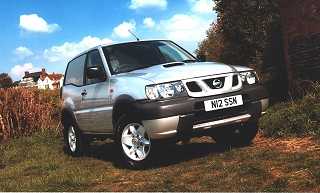
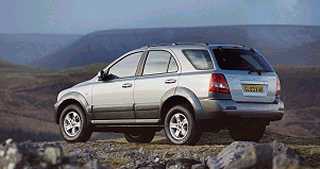 25 April 2003
25 April 2003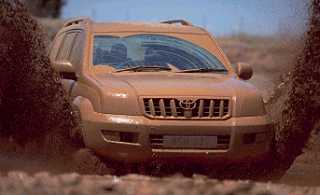 25 April 2003
25 April 2003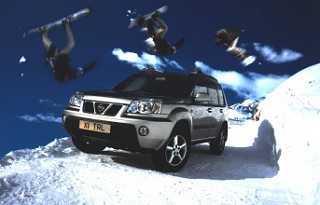
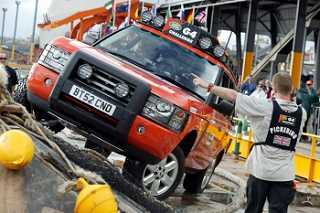
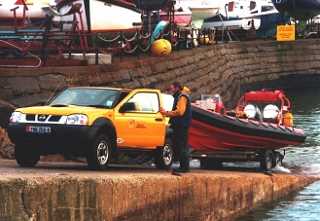
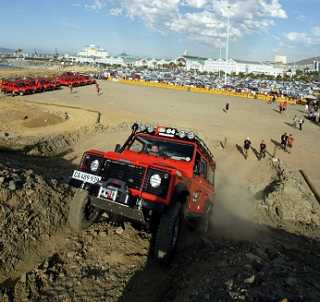
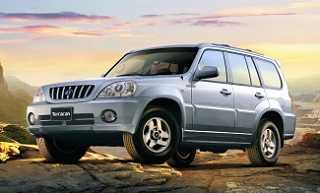 9 April 2003 Hyundai is pleased to announce that its rugged new off-road vehicle, the four-wheel drive Terracan, will be sold in the UK from this summer. The Terracan went on sale around Europe to notable acclaim in 2001, and will be available in one variant in the UK, the 2.9 CRTD The Terracan will be sold alongside the Santa Fe, Hyundai’s American-designed sports-utility vehicle. Unlike the Santa Fe, the Terracan is an out-and-out off-road car with a body-on-frame construction and full-time four-wheel drive with low-ratio box.
9 April 2003 Hyundai is pleased to announce that its rugged new off-road vehicle, the four-wheel drive Terracan, will be sold in the UK from this summer. The Terracan went on sale around Europe to notable acclaim in 2001, and will be available in one variant in the UK, the 2.9 CRTD The Terracan will be sold alongside the Santa Fe, Hyundai’s American-designed sports-utility vehicle. Unlike the Santa Fe, the Terracan is an out-and-out off-road car with a body-on-frame construction and full-time four-wheel drive with low-ratio box.
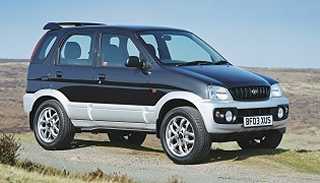 9 April Daihatsu’s popular Terios mini sport-utility range has been simplified into two new models, the Sport and the Tracker, one offering more style and both adding extra value. Most striking is the new Sport which, at £11,995 on-the-road, is only £1,015 more than the former EL but adds:
9 April Daihatsu’s popular Terios mini sport-utility range has been simplified into two new models, the Sport and the Tracker, one offering more style and both adding extra value. Most striking is the new Sport which, at £11,995 on-the-road, is only £1,015 more than the former EL but adds:
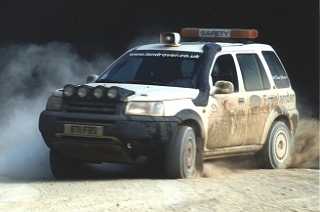
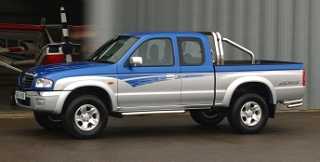
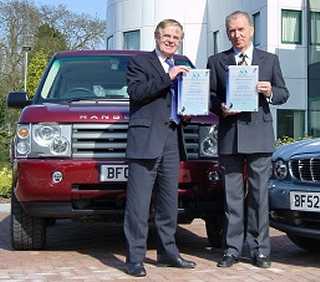
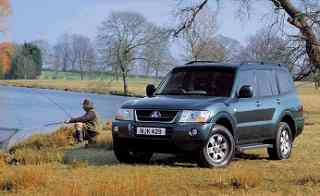
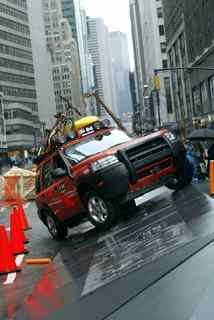
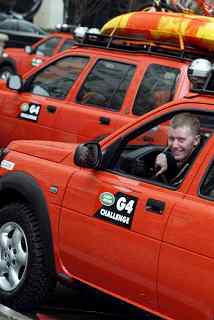
 New to Falcon 4x4, following its successful launch in the USA is the
Jackguard. An essential product for all Hi-Lift jack owners this case
finally allows your jack to be fully protected and yet still easily
accessible. The rugged watertight carrier prevents your jack from rusting
and becoming worthless even if kept on the outside of your vehicle. It
also lets you put the jack inside your vehicle if you want without getting
grease everywhere.
New to Falcon 4x4, following its successful launch in the USA is the
Jackguard. An essential product for all Hi-Lift jack owners this case
finally allows your jack to be fully protected and yet still easily
accessible. The rugged watertight carrier prevents your jack from rusting
and becoming worthless even if kept on the outside of your vehicle. It
also lets you put the jack inside your vehicle if you want without getting
grease everywhere.
